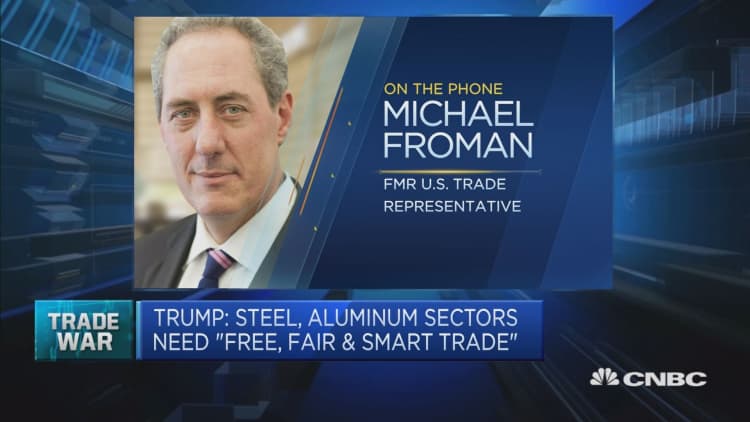
One risk in imposing U.S. tariffs on steel and aluminum imports, on the basis of national security, is that other countries can use the same reason to block trade, said former U.S. trade representative Michael Froman.
Speaking to CNBC on Friday, he said: "The U.S. has traditionally under both Republican and Democratic administrations been very reluctant to use [Section] 232 and the national security exception precisely because we worried that other countries would abuse it."
Markets are now worried about a trade war. For instance, countries could say that food supply is a national security issue to keep imports from the U.S. and elsewhere out, according to Froman, who is now at the Council on Foreign Relations.
"We could face a lot of barriers around the world," Froman said, adding that other countries may decide to opt for protectionism — imitating the U.S. in using national security exemptions in their "international trade obligations."
President Donald Trump said on Thursday that the U.S. will impose tariffs of 25 percent for steel and 10 percent for aluminum. The tariffs will be implemented broadly, without targeting specific countries.
It came after his administration announced a so-called Section 232 investigation into steel and aluminum imports in April, which sought to determine whether the imports posed a threat to the country's national security.
Agriculture is a vulnerable sector as the U.S. is a major grain producer and exporter of soybeans, corn and wheat.
Like others, Froman said it is not just a Chinese problem, but a global problem of overcapacity in steel and aluminium that needs to be addressed.
"It's mostly due to China and the question is whether this is a good way of dealing with that," he asked, referring to the tariffs announced on Thursday.
"China doesn't get particularly hit by this, it's a pretty blunt instrument. Instead, a lot of other countries will be hit," he added.
The top three steel exporting countries to the U.S. are Canada, Brazil and South Korea while the top three aluminum exporters to the U.S. are Canada, Russia and the United Arab Emirates.

